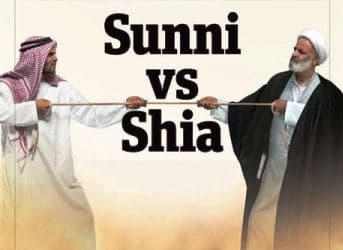Saudi Arabia and Iran, two titans of the oil industry, are heading for a headlong confrontation in what could result in a destructive and devastating new episode of conflict in the Middle East.
The potential for destructive power in the event of Tehran and Riyadh opting for a military confrontation is huge and goes well beyond anything we have seen in the region. To get an apercu of what such a conflict would entail, have a look at the civil war currently raging in Syria and multiply it tenfold.
Besides the indescribable harm that such an endeavor would have on the local populations in Iran and Saudi and in neighboring countries who might find it impossible to remain neutral in the event that such a confrontation did occur, countries such as the United Arab Emirates, Kuwait, Qatar, etc. would be terribly affected. A dispute to the finish between two major oil producing countries would also have terrible ramifications on the international oil markets.
Today, Saudi Arabia is the largest producer and exporter of total petroleum liquids in the world, and maintains the world's largest oil production capacity. Saudi has almost one-fifth of the world's proven oil reserves.
Over half of its oil reserves are contained in only eight fields. The giant Ghawar field, the world's largest oil field with estimated remaining reserves of 70 billion barrels, has more proven oil reserves than all but seven other countries.
Related article: Syria, the Next Phase
Of the great disadvantage here is that these grouped oil fields make it an easier target to hit if you were an Iranian military planner.
Iran for its part Iran holds the world's fourth-largest proven oil reserves and the world's second-largest natural gas reserves.
More than half of Iran's oil reserves are confined to five giant fields, the largest of which is the Marun field. Again, the same disadvantages that apply to Saudi Arabia also apply to Iran.
Despite growing sanctions from the European Union and the United States, and a dramatic drop in its oil production, Iran remains the second-largest OPEC producer on average during the year, it exceeded Iraq's production only narrowly.
In August 2012, its crude oil production fell below Iraq's for the first time since 1989.
Once the third-largest exporter of crude oil, Iran has seen its exports drop to 1.5 million bbl/d in 2012 as the United States and the European Union tightened sanctions that target the country's oil exports. Despite the precipitous decline in exports, it remained among the top ten exporters in 2012.
Over the past few years, Iran has expanded its domestic refining capacity to meet growing domestic demand, particularly for gasoline.
Iran is the third-largest natural gas producer in the world due in part to the development of the giant South Pars field.
All those oil wells and refineries would make easy targets in the event of a showdown.
Related article: Roadblocks on Iraq’s Leap of Faith to Oil Success
But with the oil industries in Iran and in Saudi Arabia destroyed, or severely damaged, how would the rest of the world be affected remains to be seen. Both Russia and the US have large oil reserves at home and they are also developing their own gas fields. A new Middle East war would give further incentives to the West to develop their domestic oil fields moving away from dependency on Middle Easter oil. This would be a loss from which there can be no return.
Tension between Iran and Saudi has risen to new heights with the ayatollahs calling for the destruction of the House of Saud, claiming that the royal family are the "enemy of Islam" and "arch-enemy of the entire human civilization."
Indeed, the Shi'ite Iranians and Sunni Saudis have long been at odds. At times this has flared into open conflict, as during the hajj in 1987, when about 400 people were killed as Shi'ite pilgrims fought against Saudi security forces.
The Sunni-Shiite conflicts in Iraq after the toppling of Saddam Hussein and now in Syria have significantly raised the level of hostility.
Iran’s statement Tuesday calling for the destruction of the House of Saud reads like a declaration of war.
"Time to break the last idol threatening the house of Allah," said a statement from Iran.
“What the world needs to realize is that the House of Saud is not just an enemy of Islam, it is indeed the arch-enemy of the entire human civilization. Whether you are a Christian, Jew, or Hindu, you are fit only to be killed as per Salafist theological edicts.”
“Time to break the last idol threatening the house of Allah.”
By. Claude Salhani



















I hate to say it, Iran does have a point. That really is the stuff that comes out of Saudi Arabia.
Whether it is true or not is less important than the fact that it was said, they meant it and the Saudis know they meant it. It wouldn't surprise the Saudis to know they thought this but it would shock them to hear it proclaimed publicly.
From what I understand the KSA has a military heavy on air power (compared to Iran) and Iran has missiles as their central strategy (they thought better than to try to out fight Israel with fighter jets). Both these forces favour the first strike attacker since the KSA jets could destroy the missiles before foreign or the Iranian missiles could take out the KSA planes while on the ground. After one side was grounded they would have trouble destroying the energy industry of the other while their own would be largely defenceless. With such a huge incentive to strike first they will both be watching each other like hawks.